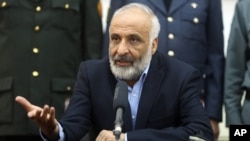Top Afghan security officials have made a surprise visit to Pakistan, to discuss mutual cooperation with civilian and military leaders following a series of deadly Taliban and other militant attacks in Afghanistan.
The visit Wednesday took place hours after U.S. Deputy Secretary of State John Sullivan urged Afghan leaders to engage in bilateral discussions with Pakistani counterparts.
Increased militant violence in Afghanistan has fueled Kabul’s tensions with Islamabad amid accusations insurgents used sanctuaries in Pakistan to plot recent suicide bombings, with the help of the country’s spy agency, ISI.
Pakistani authorities condemned the terrorist attacks and rejected the Afghan charges as unfounded and emphasized the need for “a credible investigation” into the attacks.
The Pakistani Foreign Ministry said the Afghan delegation included Masoom Stanekzai, the head of the Afghan spy agency, the National Directorate of Security (NDS), and Interior Minister Wais Barmak.
The Afghan government had requested sending its high-level team “with a message from Afghan President (Ashraf Ghani)” and for discussions about cooperation between the two countries, the ministry added.
The visitors met with Pakistani Prime Minister Shahid Khaqan Abbasi. The Pakistani interior minister, the ISI chief and other security officials assisted Abbasi in the talks. The delegation returned to Afghanistan in the evening.
While Pakistani officials did not release details of the meeting, the Afghan deputy ambassador in Islamabad, Zardasht Shams, said the delegation shared “necessary information” with their hosts about recent Taliban-claimed terrorist attacks in Afghanistan.
“They [the Afghan side] demanded that required steps in this regard be taken. In turn, the Pakistani prime minister strongly condemned recent Taliban attacks and promised to take necessary action on the basis of information provided by the Afghan side,” Shams said.
During Sullivan's visit Tuesday to Afghanistan he held extensive talks with President Ghani and Chief Executive Abdullah Abdullah.
Sullivan later talked to reporters at the U.S. Embassy, where his attention was drawn to Afghan allegations Pakistani security institutions were behind the spike in Taliban-led attacks after suspension of U.S. military aid to Islamabad. “We will continue our dialogue with Pakistan. We also encourage the government of Afghanistan to continue its bilateral discussions with Pakistan. Pakistan needs to be part of the solution,” Sullivan noted.
On Saturday, a Taliban bomber detonated an ambulance packed with explosives in central Kabul, killing more than 100 people and wounding nearly 250 others in one of the deadliest attacks in the war-torn country.
The bombing came a week after a group of heavily armed Taliban suicide bombers stormed the capital city’s Intercontinental Hotel. The assailants battled Afghan forces for about 14 hours and killed 22 people, including four Americans.
The deputy secretary said the Trump administration, under its South Asia policy, has made things clear about U.S. expectations from Pakistan.
“It’s a regional policy. It’s focused on improving the situation in Afghanistan. But it’s part of a broader regional approach that includes a relationship with Pakistan, India and other countries in the region,” Sullivan noted.
Afghan security officials visited Islamabad a day after the Pakistani government revealed it recently extradited 27 insurgents to Afghanistan, including members of the Taliban-allied Haqqani Network. The Foreign Ministry said the move is part of efforts Pakistan is making to promote a peaceful resolution of the conflict in Afghanistan.
Trump announced his South Asia strategy last August that called for Pakistan to end alleged support to terrorists staging deadly attacks on U.S. forces in Afghanistan. Islamabad rejected the charges as an attempt to scapegoat Pakistan for American “failure” to secure the war-torn country.




